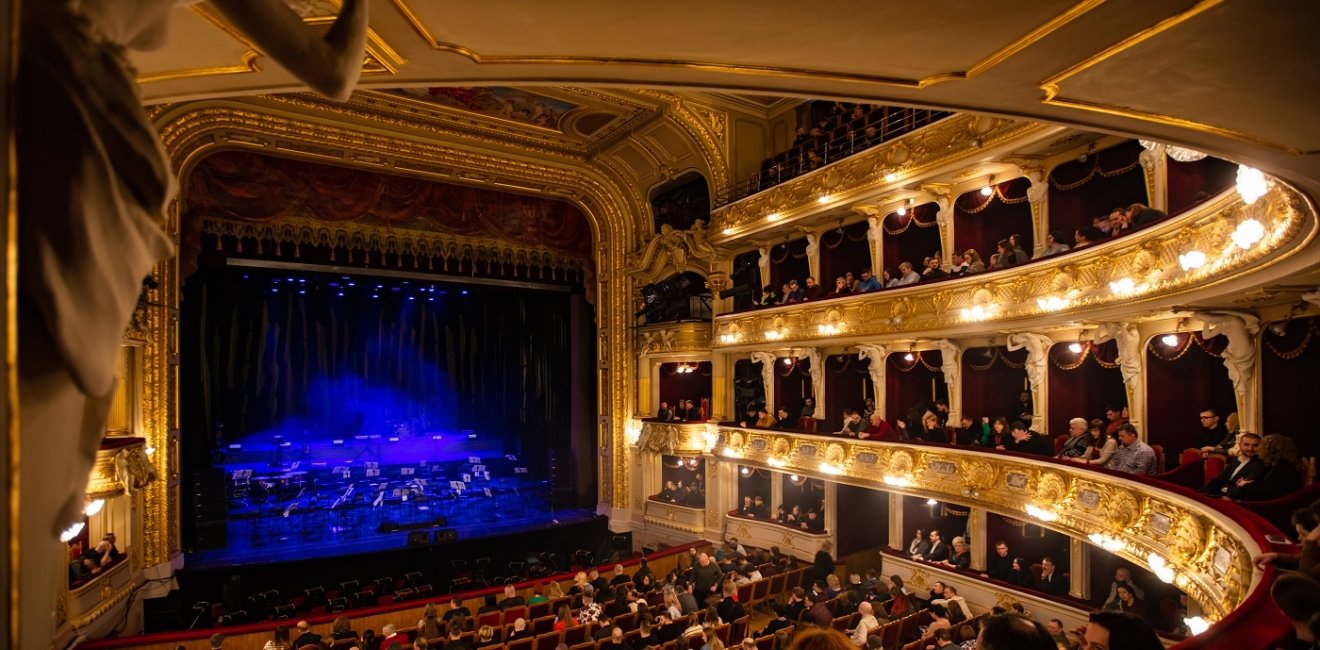
A blog of the Kennan Institute
On December 20, conductor Natalia Ponomarchuk introduced Kyiv to the music of Edward Elgar. The National Academic Symphony Orchestra of Ukraine’s program that evening featured violinist Bohdana Pivenko playing Jean Sibelius’s Violin Concerto in D minor, followed by Elgar’s Symphony no. 1 in A flat major. A notable concert program under any conditions, the evening’s performance took on additional meaning as Russian drone attacks disrupted the orchestra’s rehearsals. Elgar’s symphony had never been played before in Ukraine.
Now at the height of her career, Ponomarchuk is among those conductors in high demand around the world. In addition to serving as artistic director of the Dnipro Academic Symphony Orchestra (2003–20), and chief conductor of the National Symphony Orchestra of Ukraine (2009–11), she has performed with many of Europe’s leading orchestras, from Madrid to Warsaw, and from Milan to London. Following her graduation from the Glier Conservatory and the National Academy of Music in Kyiv, Ponomarchuk became known for promoting the works of Ukrainian composers. Now she is bringing European music previously unknown in Ukraine to Kyiv.
Ponomarchuk discovered Elgar’s music during a stint as an assistant with the London Philharmonic Orchestra. She wanted to share her passion for the British composer’s music and turned to the Elgar Society, which helped her organize the December concert.
Elgar (1857–1934) is among Britain’s best known classical composers, noted for several works including the oft-performed Pomp and Circumstance Marches. Born to a piano tuner in rural England, Elgar grew up in a musical household. Unfortunately, his family’s means proved too meager to permit him to accept an opening at the Leipzig Conservatory. Remaining at home, Elgar quickly garnered a regional reputation as a violin virtuoso. At 22, he accepted a position as conductor of the residents’ band at the Worcester and County Lunatic Asylum. That opportunity led him to Birmingham and, eventually, to London, where he would thrive despite his modest background.
Elgar’s reputation as a composer garnered British and international attention during the early years of the 20th century. In 1904, the king and queen honored Elgar by attending a three-day festival of his music at Covent Garden. He was knighted soon thereafter, and his music gained fame, especially in the United States. His first symphony (1908), the work performed in Kyiv, received over 100 performances in Britain, Germany, Russia, Canada, and the U.S. in the year following its completion. Other highly regarded works followed, ranging from violin and cello concertos and another symphony to vocal compositions and incidental music. His works were among the first to be recorded on 78 RPM discs; his November 1931 recording session opened EMI Recording Studios, famous later for its association with the Beatles (and called Abbey Road Studios after 1976).
While his reputation ebbed and flowed throughout the 20th century, Elgar’s music remained a standard fixture of concert programs, especially in Britain. Elgar’s absence from Ukraine was a consequence of both uniquely Soviet and more universal patterns in the infamously inelastic world of classical music.
The symphony orchestra repertoire has been notoriously unwelcoming to new works. Concert audiences purchase seats to hear the familiar. American and European music directors have pushed back heroically at times. Still, there are only so many concerts a year and so many possible slots for unfamiliar music.
Soviet orchestras proved even more rigid in their musical selections, though for political, rather than economic, reasons. Soviet musicians trod carefully so as not to offend their political overseers. Their caution was heightened during Stalinism when The Great Leader was himself the country’s number one critic. Poor programming decisions could prove harmful, even fatal. The result was a high culture frozen around the tastes of pre-World War One Europe. In Leningrad, this meant a preference for the “greats” of Russian classical music (many of whom, after all, were local). In Odesa, Germanic composers dominated into the late 20th century.
Lacunae developed in classical music culture everywhere. Some of Elgar’s most serious works, such as his symphonies and concertos, demand too much space on limited concert schedules, as they require nearly an hour to perform. Important works fade from view, as evident in the recent “discovery” of works by African American composers such as Florence Price, William Grant Still, and George Walker. In Ukraine, works by Ukrainian composers and overlooked foreign masters are only now opening ears.
Ponomarchuk and the National Academic Symphony Orchestra of Ukraine have advanced Ukrainian musical knowledge. Elgar’s absence from Ukraine’s concert halls nonetheless reveals a crucial challenge for Ukrainian culture as it turns forthrightly westward. Blank spots in cultural knowledge in many fields offer opportunities for creators looking to add to the cultural canon. There is so much to discover to overcome the loss inflicted by Soviet cultural constraints.
The opinions expressed in this article are those solely of the author and do not reflect the views of the Kennan Institute
Author

Former Wilson Center Vice President for Programs (2014-2017); Director of the Comparative Urban Studies Program/Urban Sustainability Laboratory (1992-2017); Director of the Kennan Institute for Advanced Russian Studies (1989-2012) and Director of the Program on Global Sustainability and Resilience (2012-2014)

Kennan Institute
After more than 50 years as a vital part of the Wilson Center legacy, the Kennan Institute has become an independent think tank. You can find the current website for the Kennan Institute at kennaninstitute.org. Please look for future announcements about partnership activities between the Wilson Center and the Kennan Institute at Wilson Center Press Room. The Kennan Institute is the premier US center for advanced research on Eurasia and the oldest and largest regional program at the Woodrow Wilson International Center for Scholars. The Kennan Institute is committed to improving American understanding of Russia, Ukraine, Central Asia, the South Caucasus, and the surrounding region through research and exchange. Read more

Explore More in Focus Ukraine
Browse Focus Ukraine
Talking to the Dead to Heal the Living

Ukrainian Issue in Polish Elections


